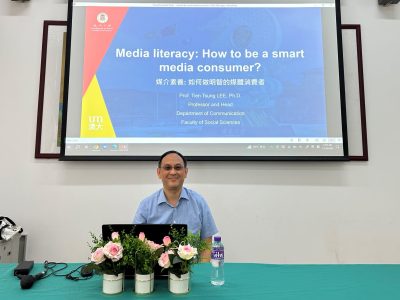MLC’s Knowledge Integration with FSS: Media Literacy: How to be a Smart Media Consumer?
MLC與FSS的知識整合:媒介素養: 如何做明智的媒體消費者
Critical thinking plays a crucial role in the realm of knowledge integration within the seven competencies of RC education. In our contemporary world, where information inundates us, acquiring the ability to discern the potentials and limitations of media is of paramount importance. Equally vital is the skill to identify biases present in media content. Recognizing the significance of these skills, Ma Man Kei and Lo Pak Sam College had the honor of hosting Professor Lee Tien Tsung, senior college fellow, Head of the Department of Communication, to deliver a seminar titled “Media Literacy: How to be a smart media consumer?” The centerpiece of his seminar was imparting techniques to detect the presence of fake news. These techniques revolved around a series of critical questions one should ask when engaging with news reports. Questions such as, “Where and under what circumstances was the news story originated?” and “Who stands to gain, and what were the underlying intentions?” were among the key inquiries explored. Professor Lee’s seminar enjoyed a full house attendance, drawing not only communication majors from MLC but also students from various colleges and academic disciplines, highlighting the widespread relevance of the topic.
批判性思維在RC教育的七項勝任力之一的“知識整合”領域中發揮著關鍵作用。在我們當代的世界中,信息淹沒了我們,獲得識別媒體潛力和限制的能力至關重要。同樣重要的是識別媒體內容中存在的偏見的技能。為了認識到這些技能的重要性,馬萬祺羅柏心學院有幸邀請到書院資深導師、傳播系主任李天宗教授舉辦一個題為“媒體素養:如何做明智的媒體消費者”的研討會。該研討會的重點是傳授檢測假新聞存在的技巧。這些技巧圍繞著在閱讀新聞報導時應該提出的一系列批判性問題。這些問題包括:“新聞故事是在哪裡和在什麼情況下產生的?”以及“誰有利可圖,背後有什麼意圖?”等關鍵問題。李教授的研討會座無虛席,吸引了不僅是MLC傳播專業的學生,還有來自各個書院和專業的學生,凸顯了這一主題的重要性。

